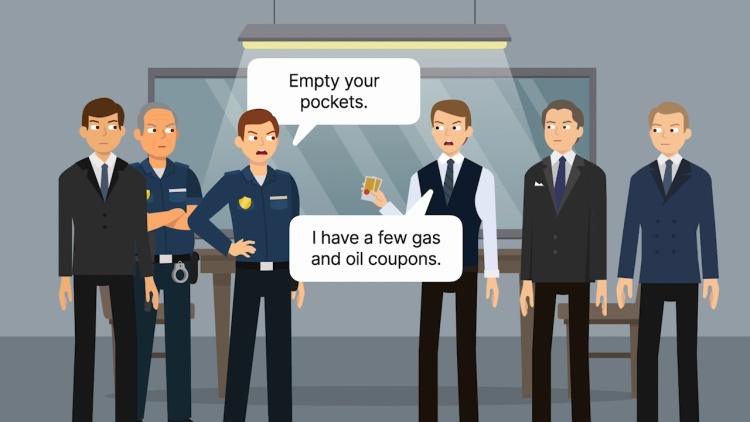United States v. Di Re
United States Supreme Court
332 U.S. 581 (1948)
- Written by Liz Nakamura, JD
Facts
Reed informed federal and state officers that Buttitta sold counterfeit gas and oil ration coupons in violation of the Second War Powers Act of 1942. Based on that information, law enforcement officers tailed Buttitta’s car and then approached the car when it stopped at the sale location Reed had described. Michael Di Re (defendant) was in the car with Reed and Buttitta. Reed was found with two counterfeit gas coupons in hand, which he stated he obtained from Buttitta. All three men were arrested. At the police station, Di Re emptied his pockets as ordered, revealing several counterfeit oil and gas ration coupons. After Di Re was formally booked, he was thoroughly searched, leading to the discovery of 100 additional counterfeit gas ration coupons. At trial, the court allowed the counterfeit coupons to be introduced as evidence over Di Re’s objections. Di Re was convicted of knowingly possessing counterfeit ration coupons. Di Re appealed, and the appellate court reversed the conviction, holding that the evidence against Di Re was inadmissible because it was obtained pursuant to an unlawful arrest. The government (plaintiff) appealed, arguing that, even if the arrest was unlawful, it had independent authorization to search Di Re as part of the lawful search of Buttitta’s car.
Rule of Law
Issue
Holding and Reasoning (Jackson, J.)
What to do next…
Here's why 907,000 law students have relied on our case briefs:
- Written by law professors and practitioners, not other law students. 47,100 briefs, keyed to 996 casebooks. Top-notch customer support.
- The right amount of information, includes the facts, issues, rule of law, holding and reasoning, and any concurrences and dissents.
- Access in your classes, works on your mobile and tablet. Massive library of related video lessons and high quality multiple-choice questions.
- Easy to use, uniform format for every case brief. Written in plain English, not in legalese. Our briefs summarize and simplify; they don’t just repeat the court’s language.





